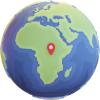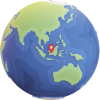Case studies are organised by region, with each region featuring links to the countries where the case studies are located.
Guyana

According to AML Intelligence, U.S. government officials have issued several warnings to Exxon Mobil, urging them to avoid business dealings with Nazar Mohamed and his son, Azruddin, two prominent figures in the Guyanese mining industry. The Mohameds are suspected of money laundering, drug trafficking, and gold smuggling. Indeed, the Mohameds are under investigation by the DEA, FBI, and Homeland Security for allegedly smuggling Colombian cocaine and Venezuelan gold, and laundering money for drug traffickers, including sanctioned Russian nationals. Reports indicate that such illegal gold trafficking funds armed conflicts and supports criminal networks. Despite these allegations, the Mohameds assert that their trade relations with American companies are legitimate. U.S. authorities have warned Exxon of such suspicions, yet AML Intelligence reports that Exxon Mobil has proceeded with a $300 million deal to build an onshore logistics base with the Mohameds in April 2022. In response, the U.S. authorities are considering sanctions against the Mohameds, which could force Exxon to sever ties with them.
Keywords: Latin America, Guyana, mining, gold, money laundering, drug trafficking, gold trafficking, smuggling, serious organised crime, terrorist and coflict financing, sanctions evasion
Sources: https://www.amlintelligence.com/2023/07/special-report-exxon-mobil-repeatedly-warned-not-to-do-business-with-mining-magnates-suspected-of-money-laundering/

In the context of Exxon Mobil’s oil extraction operations in Guyana, the article uncovers significant challenges related to organised crime and drug trafficking. The influx of foreign workers and the rapid development brought about by the oil boom have attracted criminal networks seeking to exploit the newfound wealth. These networks are involved in drug trafficking, money laundering, and other illicit activities, complicating efforts to maintain law and order. The article highlights that the oil boom has strained local infrastructure and governance, making it difficult to address the growing influence of organised crime effectively. Corruption and weak enforcement of laws further exacerbate the problem, allowing criminal organisations to flourish. The situation demands robust international cooperation, stricter regulatory frameworks, and enhanced local policing to combat the pervasive influence of organized crime and mitigate the risks associated with drug trafficking in this rapidly evolving economic landscape.
Keywords: Latin America, Guyana, minerals, serious organised crime, drug trafficking, money laundering, rule of law, corruption and bribery
Source: https://www.reuters.com/investigates/special-report/exxon-mobil-guyana/

A Venezuelan human rights organisation revealed that after being forced to leave Guyana, members of the Warao Indigenous community were forced to work for no pay in illegal gold mines. For up to three weeks, around 1,500 members of the community were unable to flee this situation of slave-like exploitation. This began in May 2021, when the Warao were rounded up and taken to work in illegal mines in Kumaka, a northern coastal area of Guyana. Guyanese recruiters enticed Warao individuals to work under false pretences, promising jobs as vegetable pickers. Instead, these individuals were sent to work in the mines under hazardous and inhumane conditions. Guyana has received thousands of Venezuelan refugees, with significant Warao migration starting in December 2020. Migrants face various exploitative schemes, with those in paid work receiving less than 50% of the average salary. Due to this precarious situation, the Warao community is at risk of being exposed to the criminal economy along the Venezuela-Guyana border, including the smuggling of drugs, oil and contraband goods.
Keywords: Latin America, Guyana, gold, primary production Indigenous rights, forced labour, modern slavery, human trafficking, illegal mining, human rights violations
Sources: https://insightcrime.org/news/venezuela-warao-indigenous-guyana-illegal-gold-mines/


The Environmental Crimes Financial Toolkit is developed by WWF and Themis, with support from the Climate Solutions Partnership (CSP). The CSP is a philanthropic collaboration between HSBC, WRI and WWF, with a global network of local partners, aiming at scaling up innovative nature-based solutions, and supporting the transition of the energy sector to renewables in Asia, by combining our resources, knowledge, and insight.


